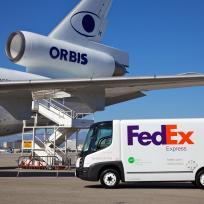Corporate Social Responsibility is Key to Successful Business
by Raj Subramaniam

Many of us take for granted the little things we can accomplish every day because we have the ability to see what is in front of us. Literally--we have eyesight. We move quickly and easily thanks to our vision.
For 8-year-old, Akash, who lives in Mumbai, India, eyesight is probably not something he takes for granted. Akash was born with exotropia, a condition that caused one of his eyes to turn in a different direction. Exotropia not only affected Akash’s vision, but also his ability to learn and his self-esteem. Because Akash lived in extreme poverty, there was no opportunity for his eyesight to be repaired, until it was determined that he qualified for a free surgery through Orbis, a non-profit organization dedicated to treating and preventing blindness—an organization that FedEx supports.
However, a last minute problem threatened the surgical procedure. Akash’s mother needed to sign a waiver to allow the surgery to happen, but no one could find her. She had left her children in foster care while she searched for a job, and doctors had not been able to track her down. That was when Priyal Warty, a Mumbai-based FedEx Marketing Specialist, stepped in. Priyal helped organize a search party to find Akash’s mother. The team ultimately found the woman and had the necessary waiver signed. Akash had successful eye surgery, and is living today with corrected vision.
The FedEx sponsorship of Orbis is just one example of corporate social responsibility (CSR)—a topic I recently addressed at Boston College’s 2014 International Corporate Citizenship Conference. I was excited to see hundreds of people in the audience representing companies that span the globe—a sign that CSR is becoming more relevant to business practice.
I believe corporate social responsibility and running a successful business are inseparable. They go hand in hand. There is a natural relationship between doing well as a company and doing good in the world. When a business grows, its capacity to do good in a community and in the world grows. Well lead, successful businesses generate profit that translates organically to social responsibility. I believe this is how the most effective CSR is generated, and how it will continue to be created.
FedEx built a commitment to CSR into the business from the very beginning—dedicating itself not just to moving packages from A to B, but also connecting people, opening them up to the global marketplace to improve the standard of living, and building social capital across the world. It’s credibility you can’t generate by simply making a donation. You have to work at this kind of reputation building. It needs to radiate from the heart of who you are as a business, and you need employees to believe in it.
It’s one of the things I admire about the 300,000 team members who make up FedEx. As I told the Boston College audience, wherever I am in the world, the FedEx culture is similar—you live by the Purple Promise. While FedEx, as a company, supports Orbis, our FedEx team member, Priyal Warty, had a bigger vision. She went the extra mile to organize a search party to help ensure an 8-year-old Mumbai boy was on track for his necessary eye surgery. You won’t find that in any corporate guidebook or instruction manual. That takes heart.
The most enduring way to build corporate reputation is to be on the street, every day, in a given community—to be local even if you’re headquartered on the other side of the world. It takes more than sight for a company to find its calling in the world of corporate social responsibility—it takes leaders with vision to drive a business toward success and sustainability, and, in the process, create a better world.

